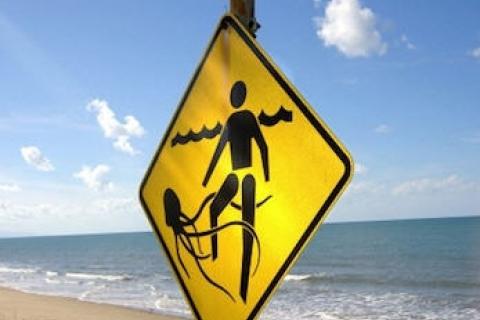
If you’re headed to salty waters for a deep sea fishing trip or beach visit, it’s a good idea to read up on jellyfish stings and come up with a plan of action to protect yourself from their painful effects.
First thing’s first: The reason you feel a painful stinging when you make contact with a jellyfish is that your skin gets injected with venom from the tentacles. Jellyfish stings are certainly not something you want to take lightly, as severe jellyfish stings, when left untreated, can result in dizziness, fever, vomiting, irregular heartbeat and even cardiac arrest.
Aside from avoiding the water altogether, what can you do to prevent these painful and potentially dangerous stings?
You can wear protective clothing to create a barrier between your skin and jellyfish, and you can also use a special lotion that protects your skin. Yes, there’s actually a jellyfish repellent-like product! Simply apply Safe Sea® Jellyfish Sting Protective Lotion to all exposed skin before heading out into the water. The product’s slippery texture can stop stinging tentacles from sticking to skin. Also, its active ingredients -- which are non-toxic in a marine environment and do not harm the jellyfish -- chemically block the sting.
In the case that you get stung by a jellyfish, get out of the water immediately. If the jellyfish sting covers a large area of the body or you’re suffering from any symptoms typical of a severe reaction, seek medical attention immediately. If your sting is less severe, it’s suggested by the Mayo Clinic that you treat the area with vinegar and remove the tentacles from skin with a rigid object like a credit card.
And while you may have heard that urinating on a jellyfish sting is the answer, contrary to popular belief, this actually may have an inverse effect. According to experts, doing so can actually make the sting worse!
Stay safe out there, and enjoy the outdoors!
Posted by Bass Pro Shop 1Source
- 17137 views

